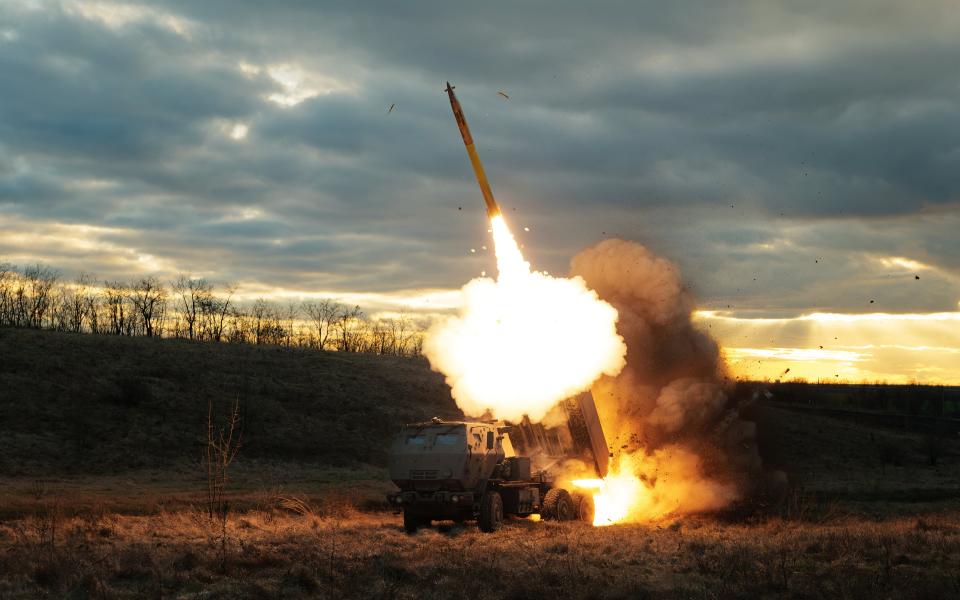The US gave up sending Ukraine Excalibur guided artillery shells costing $100,000 because they rarely hit their target, report says
The US halted deliveries of GPS-guided Excalibur shells to Ukraine due to high failure rates.
Russia had achieved success in jamming of US-supplied weapons, reports said.
Classified reports revealed the Excalibur shell strike success dropped from 55% to 6% last summer.
The US halted deliveries of Excalibur extended-range guided artillery shells to Ukraine after Kyiv reported high failure rates, anonymous Ukrainian officials told The Washington Post.
Six months ago, Ukraine told Washington that Russia's jamming of the guidance systems in several US-supplied weapons had eroded its ability to defend its territory, the officials told the Post.
The weapons most affected by the jamming were the Excalibur shells — a GPS-guided 155-mm artillery shell supplied to Ukraine — and the High Mobility Artillery Rocket System, or HIMARS.
In response, the US simply stopped further deliveries of the Excalibur shells, the Ukrainian officials said.
The cost of the Excalibur has soared, according to a Government Accountability Office report, to roughly $100,000 per shell in 2022, as much as 50 times the cost of an unguided 155mm shell, before the full-scale invasion of Ukraine in 2022.
Business Insider has reached out to the US Department of Defense for comment on the matter.
At one point, only 1 in 19 Excalibur rounds was hitting its target
Two classified Ukrainian weapons reports seen by The New York Times have since revealed the extent of the issue caused by Russian jamming.
From January to August 2023 the proportion of confirmed successful strikes with Excalibur shells dropped from a high of 55% to a low of 7% in July and 6% in August. During this time, Ukraine was attempting to wage its summer counteroffensive which ultimately failed.
Researchers collected data on the use of some 3,000 Excalibur shells fired by American-supplied M777 howitzers on the front lines in Ukraine's southern city of Kherson, the northern city of Kharkiv, and the eastern city of Bakhmut.
According to a person familiar with the report who spoke to The Times, at one point, only one in 19 Excalibur rounds was hitting its target.
One of the classified reports stated that at this rate, the price of a successful strike increased from $300,000 to $1.9 million.
When first delivered, the M982 Excalibur shells were hailed as a game changer for Ukraine. The GPS-guided 155 mm shells offered an accurate, longer-range alternative to conventional artillery shells, capable of hitting within seven feet of their target.
The Excalibur has a range of 25 miles, according to Pentagon budget documents from 2022 that first confirmed the shells had been sent to Ukraine.
Russian jamming has also affected HIMARS missile and glide bombs
The HIMARS system, which can fire rockets up to 50 miles, has also been hampered by Russian jamming, a Ukrainian military source told The Post.
"The Russians deployed electronic warfare, disabled satellite signals, and HIMARS became completely ineffective," the source told The Post. According to the assessment, Russian jamming can cause the missiles to miss a target by 50 feet or more.

The HIMARS system, which can fire rockets up to 50 miles, has also been hampered by Russian jamming, a Ukrainian military source told The Post.
"The Russians deployed electronic warfare, disabled satellite signals, and HIMARS became completely ineffective," the source told the Post. According to the assessment, Russian jamming can cause the missiles to miss a target by 50 feet or more.
Earlier this week, a report revealed that US-supplied glide bombs were continually missing their targets as a result of Russian jamming, too.
A senior US official, who was not named, told the Post that Russia "has continued to expand their use of electronic warfare, and we continue to evolve and make sure that Ukraine has the capabilities they need to be effective."
However, earlier this month Mike Nagata, a retired US Army lieutenant general who led special operations in the Middle East, said that the US is "still falling behind" in its electronic warfare capabilities, Defense One reported.
"The gap between where the United States should be and where we are, in my judgment, continues to expand not everywhere, but in far too many places," Nagata said at the SOF Week conference in Tampa, Florida.
He called on the US to get more creative to regain its dominance in electronic warfare.
Read the original article on Business Insider


